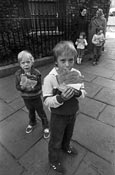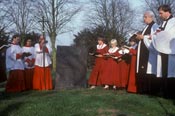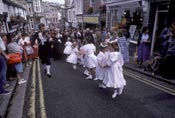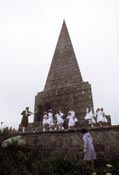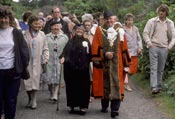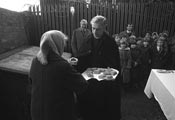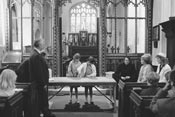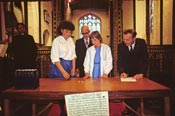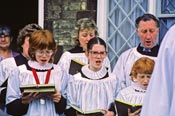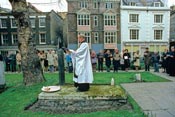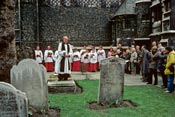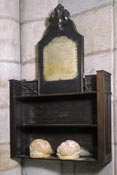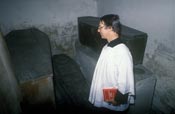
If you want to be remembered make a will with eccentric and noteworthy conditions – and which give the vicar a starring role. In 1739 Peter and Mary Davis provided for ‘Tuppenny Starvers’ to be given, on the Tuesday after Easter, to the children of the parish of St Michael-on-the-Mount Without in Bristol. William Hubbard left a guinea (£1.05 to you – was it enough?) to pay for the vicar and choir of St Mary in Arden, Market Harborough, to sing hymns over his grave on Easter Eve. John Knill trumped them all by providing £100, every fifth year, to pay for ten little girls to dance, a fiddler to play, two widows to see they do it properly, and the mayor and all the town officials of St Ives in Cornwall to officiate in a lengthy set of rituals in the town and at ‘Knill’s Steeple’ nearby. Well worth a visit, next up 2016. George Carlow was more modest; in 1811 he wanted ‘Twenty Shillings worth of good wheaten bread’ to be distributed annually to the poor of the parish of Woodbridge. Nowadays £1 doesn’t buy much bread but luckily Woodbridge can’t find many deserving poor to give it to. In 1675, in the other St Ives in Cambridgeshire, Dr Robert Wilde left £50 to buy land to provide for six boys and six girls to cast Dice for Bibles, plus ten shillings for the vicar and 12 pence for the clerk. Matthew Wilkes left funds in 1693 to pay for the vicar to preach a sermon and the choir to process to Wilkes Almshouses in Leighton Buzzard. The Butterworth Charity distributed on Good Friday at St Bartholomew the Great in London has a strange history. Several parish trusts were running short of funds so, in 1887 a parishioner, Joshua Butterworth, made the necessary arrangements to amalgamate them as one – which has borne his name ever since. These days the vicar conducts a service standing on his grave and later the congregation enjoys hot cross buns. At midday the ‘Pretty Maid’ emerges from the parish church in Holsworthy to honour the terms of the will of Rev Thomas Mayrick in 1841. In 1703 Rowland Briggs left £52 to Cartmel Priory to pay for bread for ‘the most indigent Housekeepers of this parish every Sunday for ever’. The weekly loaves still appear, but they are seldom taken. In 1571 Matthew Wall was on his way to be buried when a pall bearer fell and dropped the coffin. This fortuitously woke him up and he lived on for 24 more years and was inspired to leave money to pay for a lane to be swept, bells to be rung, a service to be held – and for him to be known evermore as ‘The Old Man of Braughing’. In 1793 Mary Gibson’s will provided funds for the minister, the clerk and churchwardens to carry out an annual inspection, on 12 August, and consequent maintenance of the Gibson family vault in Sutton, south London. There was also provision to pay for clothing for the poor but that part has fallen into abeyance due more to lack of poor than funds. Once something of a parish occasion, the inspection is still carried out, but without ceremony. It seems to be down to how the vicar feels about it!
Vicars should beware, however. Churches are bound by law to carry out these instructions, however bizarre, and there must be heavy negotiations with the Charity Commissioners before alterations can be made. The most usual reason for discontinuing is that available funds simply run out. Sometimes the solution is to amalgamate several bequests, as with Butterworth above. On the other hand some parishes go on with the ritual at their own expense because they feel it is their duty and admire the original sentiment. In Market Harborough not only had the funds run out but the church itself was closed and it is the new parish which carries on the Hymn Singing. It is not really an option just to give up, or not bother. It is all in the Charities Act 1985...
